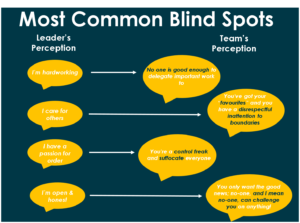For those of us who lead, traits like self-awareness and self-control should be a natural part of our emotional intelligence. But we might not know ourselves as well as we think we do – we might have blind spots that are plaguing our leadership and we don’t even know it.
Imagine someone in a coaching session, asked to describe themselves – they give a list of positive traits: hard working, caring for others, sensitive, with a passion for order, excellence, and doing great work.
Now they are asked the question: “What do you think your work colleagues would say about you?”
“About the same,” they reply.
They are stunned to learn that some of their peers and colleagues have issues with their leadership.
What they see as working hard, others see as meaning there is no-one good enough in the team to delegate to and they alone are the only one who gets the job done, right.
What they see as caring for others, others see as having favourites and a disrespectful inattention to boundaries, e.g. not asking enough questions before telling people what they need to do.
What they consider as sensitivity might come across to others as emotional distance.
Sometimes we have a blind spot when it comes to ourselves. (click on the image to enlarge)
And this blindness to our own character leads to less than effective decision-making choices and conclusions.
In one case, empathetic questioning about beliefs and self-esteem opened up the fact that, on a deep subconscious level, this leader didn’t feel worthy of their position.
So even though on a conscious level they believed they were acting positively, their subconscious anger and insecurity were leading them in ways that kept them from properly engaging with their team. Their subconscious mind was driving all their actions, and everyone could see it except them. Once identified, the positive transformation that was required was successful – and performance, results and team spirit soared. A big promotion was the reward!
Sometimes we have to re-think what we think we know about ourselves and acknowledge the possibility that we don’t know ourselves as well as we think we do.
Most of us think we are OK, even when our encounters and relationships give us evidence to the contrary. Our conscious mind selects, evaluates, and interprets information that confirms what we wish to believe.
To really know ourselves, we have to see ourselves though the eyes of others.
We have to be willing to open up to the things that we successfully hide from ourselves and overcome the resistance to dig deep to unlock our unlimited potential.
Just as we lead others with heart, we have to observe ourselves and the reactions that others have to us not with the heart but the head:
• Listen to the feedback you get from others
• Ask yourself courageous questions
• Observe the ways your conscious mind sabotages your own self-awareness
• And, most importantly, don’t assume that you are immune from the influence of inner demons

